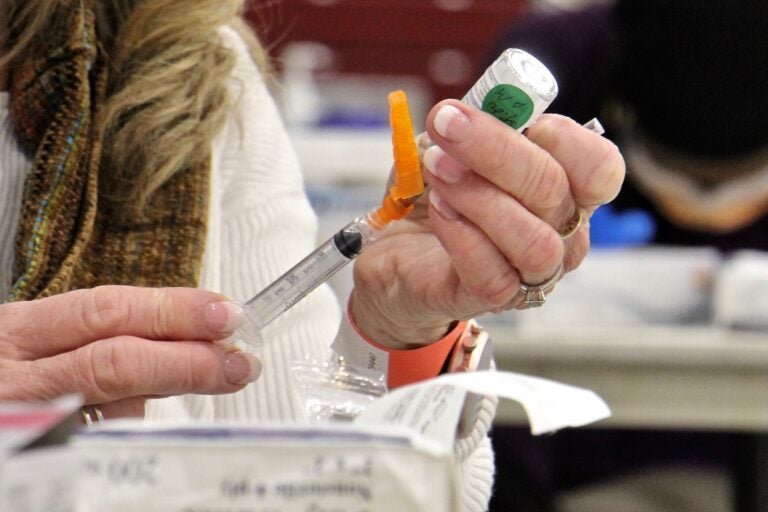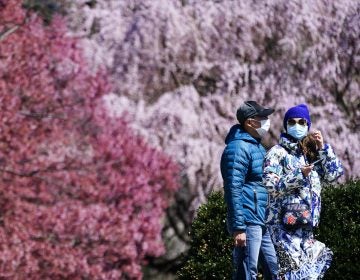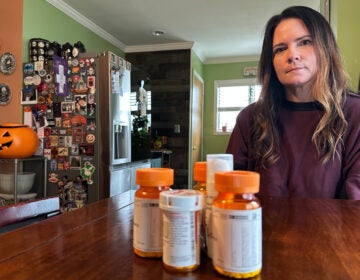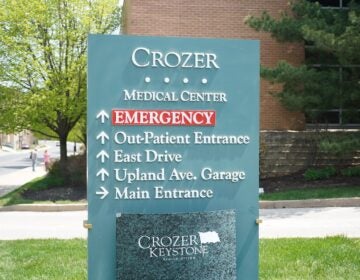Suburban counties breathe ‘huge sigh of relief’ as Pa. scraps controversial plan for regional vaccination sites
The state Health Department has ditched its plan for two PEMA vaccine sites to serve people in a combined 2,000-plus square miles. Officials are elated.

Registered nurse Pat DeHorsey draws a dose of the COVID-19 vaccine during a clinic at Montgomery County College in Blue Bell, Pa. (Emma Lee/WHYY)
Updated 6:03 p.m.
Ask us about COVID-19: What questions do you have about the coronavirus and vaccines?
Pennsylvania’s Department of Health has announced it’s scrapping a much-despised plan to establish two mass PEMA sites to handle vaccination in the populous counties around Philadelphia.
The news came as the Health Department unveiled plans Wednesday to expand vaccine eligibility monumentally in the coming weeks. And it caused a stir among local leaders in Bucks, Chester, Delaware, and Montgomery counties, who had long argued they could handle vaccination without the Pennsylvania Emergency Management Agency if only the state would give them more doses.
“We’re taking the vaccine, and we’re investing it directly into the counties, how their local leadership has requested that we invest it,” Acting Secretary of Health Alison Beam said during a Wednesday press conference.
The four collar counties are now expecting a flood of 42,000 new Johnson & Johnson vaccines a week in the near future, according to Montgomery County officials.
For weeks, officials from those counties had argued that the state’s initial plan of distributing the Johnson & Johnson vaccine to the area through a lone PEMA site rather than giving the supply directly to the counties was flawed, and would create equity and access issues.
Recently, the counties reluctantly compromised with the state on two regional sites to cover a combined 2,000-plus square miles. In that scenario, Bucks and Montgomery would have shared a site at Montgomery Mall, and Chester and Delaware counties would have shared one at Cheyney University.
Greater vaccine supply and pressure from the federal government for states to begin to expand eligibility beyond Phase 1A led to the big shift. With the PEMA plan scrapped, the suburban counties will now get what they initially asked for.
Wednesday afternoon, elected officials from around the suburbs greeted the change with open arms.
Montgomery County Commissioners Chair Valerie Arkoosh said she let out a “huge sigh of relief” when the state Health Department announced its new plan.
For weeks, Arkoosh and other suburban leaders had repeatedly urged the Wolf administration to let them give out vaccines at the mass clinics they have already set up.
At one point, the state Health Department told the Philadelphia Inquirer that county officials had “chosen to bemoan” the state’s directive for them to choose a site for the proposed PEMA clinic, and accused them of “belaboring” the process.
At a separate press conference Wednesday, Arkoosh said she believed the change in tune came largely because President Joe Biden’s administration announced it was sending a flood of new vaccines to pharmacies, which meant less need to set up regional vaccination sites.
The new plan, Arkoosh said, will “enable us to significantly accelerate the progression through our [Phase] 1A list, as well as more quickly vaccinate a number of essential frontline workers.”
Arkoosh and other county leaders have long complained that because of the state’s vaccine supply scheme, they were lagging significantly behind less populous counties when it came to distributing doses.
As it stands, Arkoosh said, there is no question that other areas of the state will get to the 1B phase of vaccine distribution before the Philly suburbs. She noted that she has already begun hearing about other counties having appointment vacancies they can’t fill with people in the 1A category.
The flood of new vaccines to the suburbs can’t come soon enough, she said.
“The biggest part of my relief,” Arkoosh said of the state’s change in course, “comes from the fact that our [COVID case] numbers are rising very quickly. I’m very concerned.”
The feeling in Delaware County was also one of relief.
“We’re happy at the end of the day,” said Rosemarie Halt, Delco’s COVID-19 health policy consultant.
Previously, Delaware County was experiencing shortages of the vaccine that led to the temporary closure of a mass clinic in Yeadon, but now things are looking up for the largest county in the United States without a health department.
“We went from getting 1,000 doses a week to 10,000 doses a week over the last two weeks. It has really significantly improved our ability to reach county residents, especially those in Phase 1A, and making sure that there was an equitable distribution, so we’re feeling more empowered,” Halt said.
Although the details are still being ironed out, the county is expecting to receive 10,500 doses of the Johnson & Johnson vaccine.
Delco plans to use the one-dose vaccine for its brand-new Homebound COVID-19 Vaccination Program, which gets the shots to people who cannot leave their homes, as well as for an in-the-works mass vaccination site that will operate on weekends.
“We have said all along that … the most equitable way and the best way to make sure that our residents have the easiest access to the vaccine is to just hand it over to the county directly and utilize the infrastructure, the resources, the volunteers, the sites that we have plans for already, so this is great,” County Councilman Kevin Madden said of the state’s change of heart.
Although Halt thinks the southeastern region of the state is still slightly lagging in vaccinating those in Phase 1A, she said the expanded eligibility will get rid of some of the confusion.
“I’m kind of glad that’s all done and that we can move into just vaccinating as many people as quickly as possible,” Halt said, adding that the only threat she sees to progress is the looming threat of the more infectious coronavirus variants.
Elected officials in Chester County, which helps with Delco’s COVID-19 vaccination rollout as it takes steps to establish its own health department, said they are pleased to see the state shift to the plan suburban leaders have touted since the very beginning.
“Our residents can now feel assured they will be able to get a vaccine without having to drive to a regional site,” the Chester County Commissioners said in a statement, noting that more details should be available in the days to come.
As they look forward to hearing word of their vaccine allotment, the commissioners’ statement said, Chester County plans to expand appointments and improve vaccine programs, such as those that target homebound residents and people experiencing homelessness.
“Importantly, we will be able to expand our equity program, under which we allocate 20% of our supply to serving disadvantaged communities,” the commissioners said.
Bucks County welcomed the state’s decision to provide the Johnson & Johnson vaccine directly to the counties. It expects to continue to receive 8,000 doses of the Pfizer vaccine every week from the state, in addition to the large sum of the J&J vaccine it will now get, according to a county spokesperson.
Referring to the Johnson & Johnson doses, Bucks Commissioners Chair Diane Ellis-Marseglia said, “This will make a huge difference in our ability to target and reach vulnerable populations and help move the list of vaccinated Bucks Countians along.”
At the moment, Bucks officials are unsure of the exact allotment, but with four county-run mass vaccination sites and a fifth on the way, the county hopes to strengthen its operation.
“To date, the equivalent of 33% of Bucks County’s adult population has received at least one dose of vaccine through various providers, and the county itself is administering thousands of doses a day. We are looking forward to using this new allocation of vaccine to protect our residents and end this pandemic,” Commissioners Vice Chair Bob Harvie said in a statement to WHYY News.
State Sen. Art Haywood serves parts of both Montgomery and Philadelphia counties. He is also a member of the bipartisan legislative COVID-19 Vaccine Task Force, a major player in decisions such as these.
“I’m glad that we got to this result, and I would say that I think that there are a number of dynamics that got us here,” Haywood said.
Though he didn’t dismiss the role that counties had in the reversal of the state’s decision, Haywood said that in addition to the advocacy, “the supply of a vaccine that the state was relying upon to create the regional sites was not forthcoming from the national government.”
From his perspective, the mass vaccination sites lost their viability as the federal government began to give more vaccines to pharmacies.
“You can’t have a mass site unless you get a mass vaccine,” Haywood said. “So the lack of vaccine, I think, was extremely significant in a determination not to do the mass clinics.”

Get daily updates from WHYY News!
WHYY is your source for fact-based, in-depth journalism and information. As a nonprofit organization, we rely on financial support from readers like you. Please give today.







